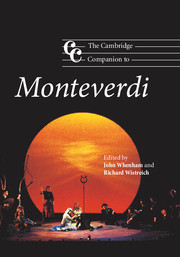Book contents
- Frontmatter
- Dedication
- Contents
- List of illustrations
- Notes on contributors
- Preface
- Chronology
- 1 Approaching Monteverdi: his cultures and ours
- 2 Musical sources
- 3 A model musical education: Monteverdi's early works
- INTERMEDIO I ‘Ecco mormorar l'onde’ (1590)
- 4 Monteverdi at Mantua, 1590–1612
- 5 Spaces for music in late Renaissance Mantua
- 6 The Mantuan madrigals and Scherzi musicali
- INTERMEDIO II ‘Ahi, come a un vago sol cortese giro’ (1605)
- 7 Orfeo (1607)
- 8 The Mantuan sacred music
- INTERMEDIO III ‘Laetatus sum’ (1610)
- 9 Music in Monteverdi's Venice
- 10 The Venetian secular music
- INTERMEDIO IV Lamento della ninfa (1638)
- 11 The Venetian sacred music
- INTERMEDIO V Magnificat SV281 (1641)
- 12 Monteverdi's late operas
- INTERMEDIO VI Il ritorno d'Ulisse (1640), Act V, scene 10
- 13 Monteverdi studies and ‘new’ musicologies
- 14 Monteverdi in performance
- Notes
- Bibliography
- Selected discography
- The works of Monteverdi: catalogue and index
- Index of titles and first lines
- Index of names and subjects
13 - Monteverdi studies and ‘new’ musicologies
Published online by Cambridge University Press: 28 September 2011
- Frontmatter
- Dedication
- Contents
- List of illustrations
- Notes on contributors
- Preface
- Chronology
- 1 Approaching Monteverdi: his cultures and ours
- 2 Musical sources
- 3 A model musical education: Monteverdi's early works
- INTERMEDIO I ‘Ecco mormorar l'onde’ (1590)
- 4 Monteverdi at Mantua, 1590–1612
- 5 Spaces for music in late Renaissance Mantua
- 6 The Mantuan madrigals and Scherzi musicali
- INTERMEDIO II ‘Ahi, come a un vago sol cortese giro’ (1605)
- 7 Orfeo (1607)
- 8 The Mantuan sacred music
- INTERMEDIO III ‘Laetatus sum’ (1610)
- 9 Music in Monteverdi's Venice
- 10 The Venetian secular music
- INTERMEDIO IV Lamento della ninfa (1638)
- 11 The Venetian sacred music
- INTERMEDIO V Magnificat SV281 (1641)
- 12 Monteverdi's late operas
- INTERMEDIO VI Il ritorno d'Ulisse (1640), Act V, scene 10
- 13 Monteverdi studies and ‘new’ musicologies
- 14 Monteverdi in performance
- Notes
- Bibliography
- Selected discography
- The works of Monteverdi: catalogue and index
- Index of titles and first lines
- Index of names and subjects
Summary
Monteverdi studies have been associated with the so-called ‘new musicology’ since the first time the latter was mentioned in print, in a column reviewing the 1991 meeting of the American Musicological Society for the New York Times. Papers on Bob Dylan, desire in Skryabin, reflections of Nazi ideology in German musicology during the Second World War, and the gendered rhetoric of the Monteverdi/Artusi controversy served the author as signs of
of a gradual transformation of … musicology … The new musicology … turns … to the movements that dominate literary studies, … not primarily interest in aesthetic issues … they might focus on the social implications of a work, or … how a work reveals the artists’ position in society or argues for a particular view of sexuality and power.
Using the phrase ‘new musicology’ three more times as he cautiously welcomed a ‘classic paradigm shift’, the writer conferred the status of a movement on an eclectic group of papers whose authors had never met. Yet the label, and the sense that it referred to some kind of movement, stuck. It was in part because the Monteverdi paper sparked criticism when it was published, leading the author to compare ‘new musicology’ to the ‘second practice’, that the label ‘new musicology’ has had a special resonance in Monteverdi studies. This essay will survey the intersections of Monteverdi studies with the new approaches to music scholarship that emerged, mainly in the United States, over the last twenty years.
- Type
- Chapter
- Information
- The Cambridge Companion to Monteverdi , pp. 249 - 260Publisher: Cambridge University PressPrint publication year: 2007
- 2
- Cited by



